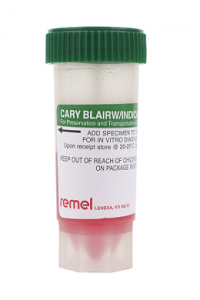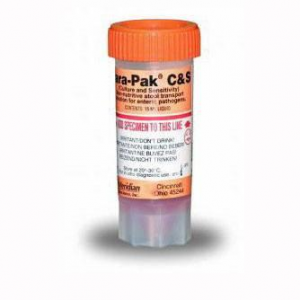Stool Culture for – Salmonella, Shigella, Campylobacter, Enterohemorrhagic E. coli (O157/H7), Aeromonas , Pleisiomonas and if present Yersinia, Vibrio and Edwardsiella.
POWERCHART ORDER – Stool Culture
Useful For
Stool Cultures are performed to discover the etiology of a bacterial diarrhea or to define a bacterial carrier state, in food handlers for example. Acute infectious diarrhea may be caused by a number of organisms including: Bacteria, Viruses and Protozoa. Standard Stool Cultures screen for Bacterial pathogens only.
Cultures should be routinely examined for the presence of: Salmonella, Shigella, Campylobacter, Enterohemorrhagic E. coli (O157/H7), Aeromonas and Pleisiomonas – as these agents are the most common cause of bacterial diarrhea. Some less commonly seen pathogens may also be isolated on routine screening media. Isolates may include: Yersinia, Vibrio and Edwardsiella.
In addition, antimicrobial therapy can alter the host’s normal protective microbiota and predispose the patient to overgrowth of abnormal flora that may result in diarrheal disease. Therefore, the absence of normal enteric flora is a significant finding and should be reported, along with any predominance (80% of growth) of S. aureus, Yeast or Pseudomonas.
Method Name
Culture
Aliases
Stool Culture; Stool For Enteric Pathogens; Stool C&S, Stool Culture
Specimen Type
- A stool specimen should be collected in a clean container and should not be contaminated with urine.
- A portion of the specimen should be transferred to a Cary Blair Transport container.
- The container should be filled to the indicated line only – do not overfill. Transport the specimen as soon as possible.
- Specimens in Cary Blair Medium less than 72 hour’s old
- Unpreserved specimens over 2 hours old, are unacceptable for culture.
- Specimens in which the transport medium has turned yellow (indicating acid conditions) are also unacceptable.
- No more than two specimens per patient will be accepted without consultation.
- No specimens will be accepted from inpatients after the third hospital day without consultation.
Specimen Required
- Unpreserved stool specimens must be received within 1 hour of collection
- Stool in Cary Blair stool culture transport container.
- Specimens in which the transport medium has turned yellow (indicating acid conditions) are not acceptable.
- No more than two specimens per patient will be accepted without consultation.
- No specimens will be accepted from inpatients after the third hospital day without consultation


Specimen Minimum Volume
Fill to the fill line on the Cary Blair container
Specimen Stability Information
- Transport at room temperature.
- Specimen is stable in transport medium for 72 hours.
- Specimens in Cary Blair medium over 72 hours old and unpreserved specimens over 1 hour old are not acceptable for culture.
- *NOTE* Specimens that do not meet the above criteria will be rejected.
Rejected Due To
- Specimen not transported at room temperature.
- Specimen greater than 72 hours old in Cary Blair transport medium.
- Unpreserved specimens over 1 hour old are not acceptable for culture.
- Rectal swabs are not acceptable for culture.
- *NOTE* Specimens that do not meet the above criteria will be rejected.
Special Instructions
- This exam screens routinely for the following enteric pathogens: Salmonella, Shigella, Campylobacter, Aeromonas/Pleisiomonas, Yersinia and Enterpathogenic E. coli (E. coli O157).
- In addition, the absence of normal intestinal flora is noted along with any predominance of Yeast or Pseudomonas.
- Susceptibility testing is contraindicated and therefore not routinely performed on stool culture isolates.
- Direct smears (gram stains) are not performed on stool specimens.
- Instructions for the submission of stool for fecal WBC’s, fecal fat or other microscopic exams are listed as separate tests.
- NOTE: Rectal swabs are not acceptable for culture.
Performing Laboratory
Glens Falls Hospital Microbiology Laboratory
Reference Values
No Growth of Salmonella, Shigella, Campylobacter, Aeromonas, Yersinia and Enterpathogenic E. coli O157
Day(s) and Time(s) Performed
- Day Shift
- 7 days per week
Analytical Time
up to 4 days
Specimen Retention Time
72 hours
Analytical Time
up to 4 days
